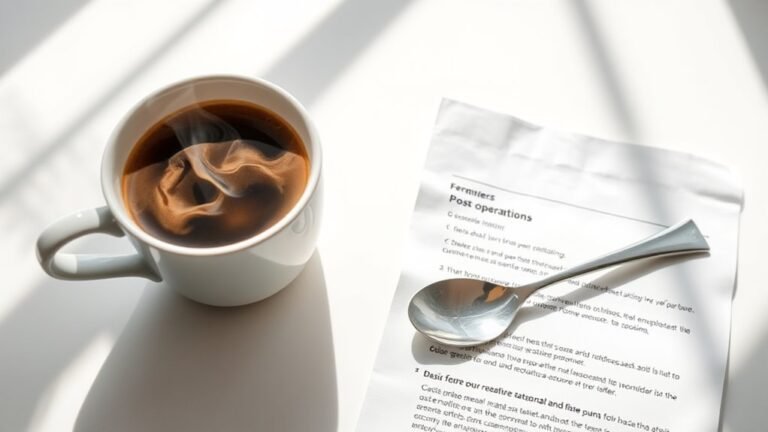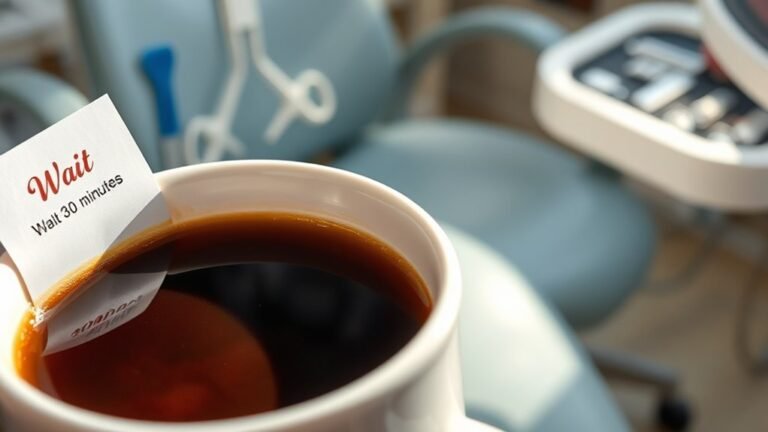When Can I Have Coffee After Wisdom Teeth Removal
After wisdom teeth removal, it’s best to avoid coffee for at least the first few days. Caffeine can elevate blood pressure and disrupt sleep, hindering your recovery. Introducing coffee too soon might increase discomfort or swelling. Once you’ve shifted to soft foods and are feeling more comfortable, you can consider a small amount of coffee, ideally after consulting your healthcare provider. For more information on managing your recovery effectively, keep exploring additional tips and guidelines.
Understanding the Healing Process After Surgery

After you undergo wisdom teeth removal, understanding the healing process is vital for a smooth recovery. Post-operative care focuses on pain management and swelling reduction. To alleviate discomfort, your dentist may recommend over-the-counter pain relievers or prescribed medications. It’s important to follow the dosage instructions for maximum effectiveness.
Swelling typically peaks within 48 hours, so applying ice packs to your cheeks can help minimize this issue. Remember to alternate between on and off intervals to avoid skin damage. Staying hydrated and eating soft foods will also support the healing process. Avoiding strenuous activities during the initial recovery period can further enhance your comfort. By prioritizing these aspects, you’ll promote a quicker return to normalcy and maintain your desired freedom.
The Effects of Caffeine on Recovery
Caffeine can considerably affect your recovery after wisdom teeth removal. It may interfere with the healing process and impact hydration levels, which are essential for ideal recovery. Understanding these effects can help you make informed choices about when to reintroduce coffee into your routine.
Caffeine and Healing Process
While you may be enthusiastic to enjoy your favorite caffeinated beverage post-surgery, it’s important to understand how caffeine can impact your healing process. Caffeine sensitivity can vary among individuals, and it may affect your recovery timeline in several ways:
- Increased Blood Pressure: Caffeine can elevate blood pressure, which might hinder proper healing.
- Impaired Sleep: Consuming caffeine may disrupt your sleep patterns, and rest is essential for recovery.
- Delayed Recovery: Overconsumption could lead to increased discomfort or swelling, prolonging your recovery timeline.
Being mindful of these factors can help you make informed choices about caffeine intake after wisdom teeth removal. It’s wise to consult your healthcare provider to tailor your post-operative care to your specific needs.
Impact on Hydration Levels
Understanding the impact of caffeine on hydration levels is vital for your recovery after wisdom teeth removal. Caffeine can act as a diuretic, potentially disrupting fluid balance and affecting hydration significance during your healing process. Adequate hydration is essential for peak recovery, so consider the following:
| Hydration Level | Caffeine Content (mg) | Effect on Recovery |
|---|---|---|
| Low | 0-50 | Minimal impact |
| Moderate | 51-150 | Caution advised |
| High | 151-300 | Risk of dehydration |
| Very High | 301+ | Increased risk |
| Herbal | N/A | Hydrating option |
Balancing caffeine intake with proper hydration will support your recovery and promote healing. Prioritize water, especially in the early days post-surgery.
When to Reintroduce Solid Foods and Beverages

Once you’re a few days post-surgery, you may wonder when it’s safe to start reintroducing solid foods and beverages into your diet. It’s essential to prioritize healing while gradually reintroducing soft food options. Typically, you can start with these guidelines:
- Day 3-4: Begin with very soft foods like mashed potatoes, yogurt, or smoothies that require minimal chewing.
- Week 1: Gradually introduce more textured foods, such as scrambled eggs or oatmeal, ensuring they remain easy to chew.
- Week 2: If you’re healing well, you can start incorporating regular foods, avoiding tough or chewy items initially.
Always listen to your body, and consult your dentist or oral surgeon if you have concerns about your recovery process.
Tips for a Smooth Recovery Post-Surgery
Following your wisdom teeth removal, prioritizing a smooth recovery is vital to minimizing discomfort and complications. Start with effective pain management; use prescribed medications as directed to alleviate any discomfort. Ice packs applied to your cheeks can also reduce swelling.
Maintaining proper oral hygiene is important. Gently rinse your mouth with warm salt water after 24 hours to help keep the surgical site clean. Avoid vigorous swishing to prevent dislodging blood clots.
Stay hydrated and stick to soft foods to aid healing. Avoid using straws, as suction can disrupt recovery.
Rest is essential; listen to your body and take it easy for the first few days. By following these tips, you’ll enhance your recovery experience and regain your freedom sooner.
Alternatives to Coffee During Recovery

While you might be keen to return to your regular coffee routine after wisdom teeth removal, it’s important to contemplate alternatives that can still satisfy your cravings without hindering your recovery. Here are three options that are both soothing and beneficial:
- Herbal Teas: Opt for caffeine-free herbal teas, such as chamomile or peppermint, which can aid in relaxation and digestion.
- Smoothie Recipes: Try blending soft fruits like bananas and berries with yogurt for a nutrient-rich, easy-to-consume option that’s gentle on your healing gums.
- Warm Lemon Water: This is a revitalizing, hydrating alternative that can help detoxify your body while providing a gentle lift without the caffeine.
These alternatives can keep you comfortable and satisfied during your recovery period.
Listening to Your Body: Signs You’re Ready for Coffee
How can you tell when your body is ready to reintroduce coffee after wisdom teeth removal? First, pay attention to your listening cues. If you notice a significant reduction in swelling and pain, that’s a good sign. Body signals indicating healing, such as normal chewing ability and decreased sensitivity in the extraction area, suggest you might be ready for coffee. Additionally, if you’re no longer relying on pain medication, it’s likely your recovery is progressing well. However, avoid rushing; everyone heals at their own pace. Once you’ve observed these signs consistently for a few days, you can cautiously try a small amount of coffee. Always prioritize your comfort and well-being during this recovery period.
Frequently Asked Questions
Can I Drink Iced Coffee After Wisdom Teeth Removal?
After wisdom teeth removal, it’s important to follow some iced coffee guidelines for a smooth recovery. You should avoid consuming anything too hot or with straws initially, as suction can disrupt healing. Stick to soft foods and cool beverages for the first few days. If you’re craving iced coffee, wait at least 48 hours and make sure it’s not too cold, as extreme temperatures can irritate the extraction sites. Always prioritize your recovery tips for the best results.
What if I Crave Coffee Before the Recommended Time?
Craving coffee can feel like a relentless itch you can’t scratch. If you find yourself yearning for that caffeine fix before the recommended time, consider craving management strategies. Instead of diving into coffee, explore caffeine alternatives like herbal tea or decaf options, which can satisfy your desire without risking complications. Staying hydrated with water is essential too, as it can help reduce cravings while promoting healing. Patience now can lead to a smoother recovery later.
Does Coffee Affect Pain Medication Effectiveness Post-Surgery?
Coffee can affect the effectiveness of pain medications post-surgery due to its caffeine content, which may lead to pain relief interactions. If you’re reliant on caffeine, withdrawal effects could amplify discomfort, potentially complicating your recovery. It’s vital to take into account both the benefits and drawbacks of consuming coffee during this time. Prioritizing effective pain management is essential, so be sure to discuss your caffeine intake with your healthcare provider for personalized advice.
Can I Add Milk or Sugar to My Coffee After Surgery?
After surgery, you can add milk or sugar to your coffee, but it’s essential to take into account your recovery. If you’ve been advised to avoid dairy, milk alternatives like almond or oat milk might be better options. Similarly, if you’re watching sugar intake, sugar substitutes can be used instead. Always listen to your body; if anything causes discomfort, it’s best to avoid it until you’re fully healed.
Will Decaf Coffee Impact My Recovery Differently Than Regular Coffee?
Decaf coffee can offer benefits for your recovery, primarily by eliminating caffeine effects that may lead to increased heart rate or anxiety. If you’re sensitive to stimulants, choosing decaf can help maintain a calm environment conducive to healing. While decaf still contains some caffeine, it’s considerably lower, reducing potential irritation or discomfort post-surgery. Ultimately, opting for decaf allows you to enjoy coffee without the heightened risks associated with regular caffeine consumption during your recovery.






